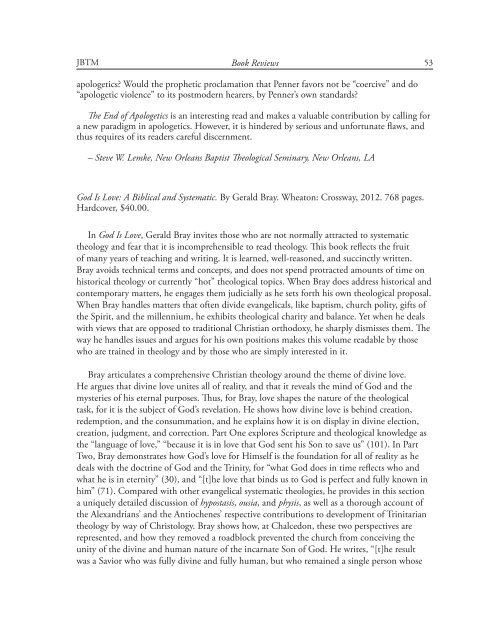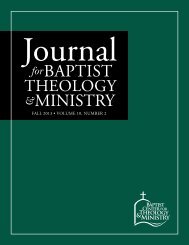Bible Translation as Missions
pTf2MG
pTf2MG
Create successful ePaper yourself
Turn your PDF publications into a flip-book with our unique Google optimized e-Paper software.
JBTM Book Reviews53apologetics? Would the prophetic proclamation that Penner favors not be “coercive” and do“apologetic violence” to its postmodern hearers, by Penner’s own standards?The End of Apologetics is an interesting read and makes a valuable contribution by calling fora new paradigm in apologetics. However, it is hindered by serious and unfortunate flaws, andthus requires of its readers careful discernment.– Steve W. Lemke, New Orleans Baptist Theological Seminary, New Orleans, LAGod Is Love: A Biblical and Systematic. By Gerald Bray. Wheaton: Crossway, 2012. 768 pages.Hardcover, $40.00.In God Is Love, Gerald Bray invites those who are not normally attracted to systematictheology and fear that it is incomprehensible to read theology. This book reflects the fruitof many years of teaching and writing. It is learned, well-re<strong>as</strong>oned, and succinctly written.Bray avoids technical terms and concepts, and does not spend protracted amounts of time onhistorical theology or currently “hot” theological topics. When Bray does address historical andcontemporary matters, he engages them judicially <strong>as</strong> he sets forth his own theological proposal.When Bray handles matters that often divide evangelicals, like baptism, church polity, gifts ofthe Spirit, and the millennium, he exhibits theological charity and balance. Yet when he dealswith views that are opposed to traditional Christian orthodoxy, he sharply dismisses them. Theway he handles issues and argues for his own positions makes this volume readable by thosewho are trained in theology and by those who are simply interested in it.Bray articulates a comprehensive Christian theology around the theme of divine love.He argues that divine love unites all of reality, and that it reveals the mind of God and themysteries of his eternal purposes. Thus, for Bray, love shapes the nature of the theologicalt<strong>as</strong>k, for it is the subject of God’s revelation. He shows how divine love is behind creation,redemption, and the consummation, and he explains how it is on display in divine election,creation, judgment, and correction. Part One explores Scripture and theological knowledge <strong>as</strong>the “language of love,” “because it is in love that God sent his Son to save us” (101). In PartTwo, Bray demonstrates how God’s love for Himself is the foundation for all of reality <strong>as</strong> hedeals with the doctrine of God and the Trinity, for “what God does in time reflects who andwhat he is in eternity” (30), and “[t]he love that binds us to God is perfect and fully known inhim” (71). Compared with other evangelical systematic theologies, he provides in this sectiona uniquely detailed discussion of hypost<strong>as</strong>is, ousia, and physis, <strong>as</strong> well <strong>as</strong> a thorough account ofthe Alexandrians’ and the Antiochenes’ respective contributions to development of Trinitariantheology by way of Christology. Bray shows how, at Chalcedon, these two perspectives arerepresented, and how they removed a roadblock prevented the church from conceiving theunity of the divine and human nature of the incarnate Son of God. He writes, “[t]he resultw<strong>as</strong> a Savior who w<strong>as</strong> fully divine and fully human, but who remained a single person whose



